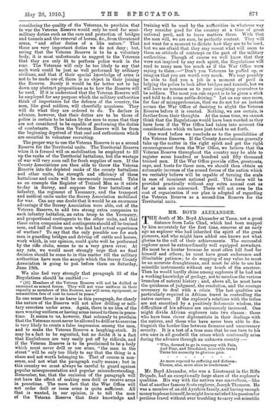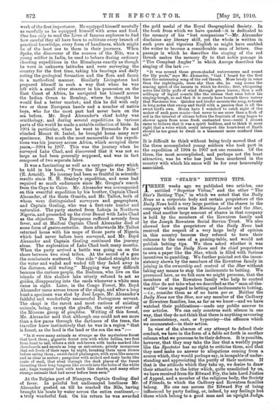MR. BOYD ALEXANDER.
THE death of Mr. Boyd Alexander at Tama, not a great distance from Lake Chad, which had been mapped by him accurately for the first time, removes at an early age an explorer who had inherited the spirit of the great pioneers, and who might have added one knows not what glories to the roll of their achievements. The successful explorer must be extraordinarily well equipped nowadays. He must be a hunter because he must often kill food for himself and others ; he must have great endurance and illimitable patience ; to do mapping of any value he must be an accurate draughtsman, and must be able to use his scientific instruments without any touch of the amateur. Then he would hardly shine among explorers if he had not a working knowledge of geology, not to mention the various branches of natural history ; and, above all, he must have the quickness of judgment, the resolution, and the courage necessary to deal with a crisis. The last qualities are particularly required in African travel in controlling the native carriers. If the explorer's relations with the tribes are not smoothed by a positively Solomonic wisdom, the difficulties of his advance are enormously increased. One might divide African explorers into two classes : those who have been clever diplomatists in their dealings with the natives, and those who have never been able to dis- tinguish the border-line between firmness and unnecessary severity. It is a test of a true man that he can turn to his own uses in all goodwill the crises which continually arise during the advance through an unknown country :— "Who, doomed to go in company with Pain, And Fear, and Bloodshed, miserable train I Turns his necessity to glorious gain.
As more exposed to suffering and distress : Thence, also, more alive to tenderness."
Mr. Boyd Alexander, who was a Lieutenant in the Rifle Brigade, had an exceptionally large share of the explorer's qualities. His way with the natives was marvellous,—like that of another famous Scots explorer, Joseph Thomson. He was a member of an old Ayrshire family, and having enough money to please himself, he might have satisfied his passion for perilous travel without ever troubling to carry out scientific work of the first importance. He equipped himself mentally as carefully as he equipped himself with arms and food. One has only to read the Lives of famous explorers to find how careful they all have been to cultivate every branch of practical knowledge, every form of handiness, which might be of the least use to them in their journeys. When Speke, the discoverer of the sources of the Nile, was a young soldier in India, he used to behave during ordinary shooting expeditions in the Himalayas exactly as though he were in unknown latitudes and were surveying the country for the first time, taking his bearings and daily noting the geological formation and the flora and fauna in a methodical manner. Similarly Livingstone had prepared himself in such a way that when he was left with a small river steamer in his possession on the East Coast of Africa, he navigated her himself across the Indian Ocean to Bombay, where he thought he would find a better market ; and this he did with only two or three European hands and a number of native boys, who for the most part had never been on the sea before. Mr. Boyd Alexander's chief hobby was ornithology, and during several expeditions in various parts of the world he made a notable collection of birds. In 1904 in particular, when he went to Fernando Po and climbed Mount St. Isabel, he brought home many new specimens. But much the most memorable of his expedi- tions was his journey across Africa, which occupied three years,-1904 to 1907. This was the journey when he surveyed Lake Chad, and discovered that it was not so large as had been generally supposed, and was in fact composed of two separate lakes.
It was a fascinating as well as a very tragic story which he told in his book, " From the Niger to the Nile " (E. Arnold). No journey had been so fruitful in scientific results since H. M. Stanley's expedition, and none had required so much endurance since Mr. Grogan's march 0 from the Cape to Cairo. Mr. Alexander was accompanied on this eventful expedition by his brother, Captain Claud Alexander, of the Scots Guards, and Mr. Talbot, both of whom were distinguished surveyors and geographers, and Captain Gosling, who was a first-rate hunter and naturalist. The party started from Lokoja in Northern Nigeria, and proceeded up the river Benue with Lake Chad as the objective. The Europeans suffered severely from fever, and at Maifoni Captain Claud Alexander died of some form of gastro-enteritis. Soon afterwards Mr. Talbot returned home with his maps of those parts of Nigeria which had never before been surveyed, and Mr. Boyd Alexander and Captain Gosling continued the journey alone. The exploration of Lake Chad took many months. When the party arrived a battle was going on on the shore between two rival tribes. At the sound of a gun the combatants scattered. One side " dashed straight into the water and waded and waded till they faded away in the distance, still wading." Mapping was very difficult because the curious people, the Buduma, who live on the islands of this shallow lake utterly refused to act as guides, disappearing into the reeds whenever a white man came in sight. Later, in the Congo Forest, Mr. Boyd Alexander came across traces of the okapi, and after a long hunt a specimen was shot by Jose Lopes, Mr. Alexander's faithful and wonderfully resourceful Portuguese servant. The okapi is the rarest and most curious of existing animals, being, except the giraffe, the only survivor of the Miocene group of girafidae. Writing of this forest, Mr. Alexander said that although one could not see more than a few paces through the darkness of the trees, the traveller knew instinctively that he was in a region " that is forest, as the land is the land or the sea the sea" :— " In it were many animals as strange as the mysterious forest that bred them; gigantic forest rats with white bellies, two feet from head to tail, others a rich red-brown with backs marked like chessboards and snouts as long as ant-eaters; grizzly mongooses that rob fowls of their eggs by night, breaking them upon stones before eating them ; sweet-faced phalangers, with eyes like saucers and as clear as amber ; pangolins with arched and scaly backs like coats of mail, that steal through the dark places of the forest thrusting their long tongues like swords into the holes of the white ant ; huge vampire bats with teeth like sharks, and many other strange animals that had never before been seen."
At the Belgian port of Niangara Captain Gosling died of fever. In painful but undismayed loneliness Mr. Alexander pushed on till he reached the Nile, having brought his boats by water across the entire continent,— a truly wonderful feat. On his return he was awarded the gold medal of the Royal Geographical Society. In the book from which we have quoted—it is dedicated to the memory of his " lost companions "—Mr. Alexander disclaims any literary skill, yet the whole is written in such pure and vigorous English as might have enabled the writer to become a considerable man of letters. One passage in which he describes the singing of the red thrush makes the memory fly to that noble passage in " The Compleat Angler " in which Auceps describes the singing of the lark :— " It was around these green-shaded watercourses and round the lily pools," says Mr. Alexander, "that I heard for the first time the entrancing song of the red thrush. More lovely in voice than the nightingale, more shy than she, hi: +ong seems the soaring spirit of the haunts in which he dwells ; first, whispering notes like little puffs of wind through green leaves; then a soft soliloquy of liquid sounds like the stream that runs below his singing-bough, so sad that it is surely here beneath these waters that Narcissus lies. Quicker and louder mounts the song, to break in long notes that swoop and thrill with a passion that is all the sweet bird's own. Hours have I watched to catch sight of the maker of such pure music—but never to see more than a flash of red in the interval of silence before the fountain of song began to shower again from some fresh enchanted tree—until I almost came to believe that it was a spirit bodiless, and to think it most right that a voice which could interpret the heart-beat of Earth should be too great to dwell in a tenement more confined than air."
It is difficult to think without being truly moved that of the three accomplished young soldiers who took part in the expedition of 1904 to 1907 not one remains. Of the three, the most accomplished, and perhaps not the least attractive, was he who has just been murdered in the country with which his name will be for ever honourably associated.















































 Previous page
Previous page